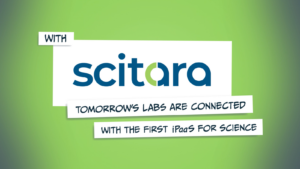Scitara recently hosted a webinar dedicated to the transformation of laboratories through digital advancements. Renowned industry expert Pat Pijanowski provided his insights, delving into the fundamental components of digital lab transformation and its capacity to generate positive business impacts within a laboratory context. The webinar also explored the pivotal role of technology facilitators, such as digitizing data, formulating a coherent data strategy, managing data abundance, enhancing collaboration and compliance through augmented and extended reality, and harnessing cloud and platform technologies.
Pat, leveraging his extensive experience in optimizing and digitizing laboratories, emphasized the critical need to center the transformation around business outcomes and align the entire organization with a common aspirational objective. He stressed the significance of securing support from executive leadership, fostering alignment among stakeholders, and equipping individuals to function effectively in the new digital environment. Pat also underlined the role of a corporate talent strategy as a catalyst for investments in digital transformation, particularly in attracting and retaining top talent in an increasingly digital-native workforce.
During the webinar, Jeff Mazzeo, Scitara’s CMO, introduced Scitara DLX, a revolutionary product designed to digitally interconnect all laboratory assets, facilitating seamless data exchange across interconnected systems. Jeff elucidated how Scitara DLX functions as an integration platform, translating data between diverse formats and automating data flows. He highlighted the product’s versatility, scalability, rapid deployment capabilities, and its role in enhancing data integrity.
The discussion also delved into the challenges associated with implementing digital transformation and emphasized the importance of breaking this journey into manageable, incremental steps. Pat underscored the necessity of maintaining an adaptable team and establishing decision-making mechanisms capable of addressing unforeseen changes. Furthermore, he stressed the significance of capitalizing on existing enterprise-level platforms and technologies, such as cloud computing and artificial intelligence, to drive digital lab transformation.
The active participation of the audience during the Q&A session resulted in inquiries regarding data protection against malware, the relevance of guided method execution, and strategies for persuading stakeholders to invest in abstract elements of digital transformation. Pat provided insightful responses, emphasizing the need to align with corporate security strategies, leverage existing security technologies, and center efforts around business transformation objectives to garner stakeholder support.
In summary, the webinar shed light on the critical components of digital lab transformation and the instrumental role of technology enablers in driving positive business outcomes. It underscored the importance of establishing a shared aspirational goal, pursuing transformation through incremental steps, and embracing an ecosystem mindset for a successful digital transformation journey. The insights and guidance provided in this session are anticipated to aid in the journey towards revolutionizing laboratories through digital transformation.
Click here to view the webinar recording.
